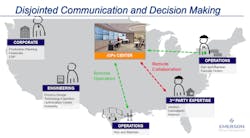As Emerson Process Management celebrated the grand opening of its latest innovation center this week, much attention was directed toward its integrated operations center (iOps), where Emerson is able to showcase the combination of its control and operations capabilities, integrating corporate, operations and engineering functions through a variety of collaborative tools.
The Emerson Innovation Center in Round Rock, Texas, is the third such center globally, the other two opened previously in Marshalltown, Iowa (for flow control), and Pune, India (for software applications). The Round Rock center, near Austin, focuses on process systems and solutions—what Jim Nyquist, president of the division, described as the brains of the automation system. The 282,000 ft2, nearly $70 million facility will be the global headquarters for Emerson’s automation systems and project services business, focused on process industries such as oil and gas, refining, chemicals, power, life sciences, food and beverages, and metals and mining.
Many of these industries operate in what David Farr, Emerson’s chairman and CEO, described as a 4-D environment—dull, dangerous, distant and dirty. “In the past, the workers had to be on site, checking the data with other parts of the world,” he said. But now, with a combination of pervasive sensing, wireless technologies and virtualization, manufacturers can get more of their workers out of those environments and into more collaborative control rooms.
Those 4-D environments present many challenges to process industries, noted Peter Zornio, chief strategic officer for Emerson Process Management, who also pointed to processes that are becoming much more complicated, as well as worker shortages that present even more difficult operating conditions. Job functions—operational silos of planning, operations, maintenance and safety—can become very departmentalized, he said. “That especially happens when we see these functions being geographically separated, which they frequently are.”
When it’s time to make a decision, these functions need to collaborate, but it can take a week to get all the people on board and working together to make a decision, Zornio described. As part of its opening activities this week, Emerson presented a scenario in which a gas company needed to make a decision about whether it could successfully pull together all the necessary resources to accept a large order of LNG. The goal was to make the decision within the hour, which was achieved through local and remote collaborations with internal and external experts.
It was a scenario that relied on reliable, secure, high-bandwidth connections; pervasive sensing; and an automation system (Emerson’s DeltaV, in this case) to bring it all together. “Process facilities are often run by local operators who may or may not be in touch with other parts of the company, like logistics or engineering,” he said. “What if we can improve the efficiency and effectiveness of these organizations by helping them communicate?”
The number of visits to Emerson’s facility in Round Rock has quadrupled since the collaboration center has been in place, mentioned Aaron Crews, manager of business development for Emerson Process Management. The center has had 80 customer visits in the past 85 days, he added.
Emerson expects more than 200 customers engagements this year at its innovation center in Round Rock, with 800 individuals visiting from 13 countries, Nyquist said. He called the iOps center one of the most exciting new things Emerson has set its sights on, helping its customers apply new technologies and processes to solve their challenges.
“Our customer collaboration center was absolutely crucial to our vision of being an innovation center,” Nyquist said.
In addition to the iOps center, the Emerson Innovation Center in Austin is comprised of several other disciplines:
- A technology and product design and support center, providing engineering and development for the DeltaV digital automation system and DeltaV SIS Safety System.
- The Emerson Process Management Human Centered Design Institute, a consulting and engineering practice that drives usability-based design into all products Emerson Process Management designs and manufacturers.
- An interoperability and testing lab in which Emerson tests both its own products as well as competitors’ to ensure safe, reliable and robust operation.
- The Life Sciences Industry Center provides consulting, engineering and project management expertise to support pharmaceutical and biotechnology customers.
- Educational Services, where more than 2,500 customer personnel gain product, technology and operational skills on the latest technologies.
- The Project Management Office aligns and integrates the company’s best practices, processes, systems and metrics for global project execution.
About the Author
Aaron Hand
Editor-in-Chief, ProFood World

Leaders relevant to this article:
